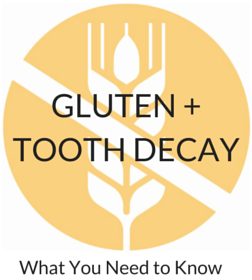Buzz around gluten-free lifestyles has surged in recent years. Gluten intolerance, often recognized as Celiac Disease, is most commonly known for causing painful gastrointestinal issues. A less familiar and dangerous manifestation of the disease takes place at the site of gluten ingestion, in the mouth.
A study published by European Journal of Internal Medicine revealed that 85% of Celiac Disease patients showed marked enamel damage or tooth abnormality. Dental defects can be irreversible if left untreated, as well as cause pre-mature tooth loss.
About gluten sensitivity
Gluten is a protein, found in wheat and other related grains. Numerous foods, cosmetics and household products contain gluten. Adverse health effects related to gluten intolerance are caused by a profound sensitivity, autoimmune response or allergy triggered after the consumption of the protein.
Read more: Eating Candy Hurts Your Teeth?
The effects of gluten on teeth
An overwhelming number of patients with Celiac Disease suffer from a range of oral health issues. Gluten sensitivity can cause Enamel Hypoplasia, deficiency and erosion of tooth enamel, because gluten disrupts the body’s ability to absorb essential vitamins and minerals, such as Vitamin D. Gluten also prevents the production Vitamin K, which is essential to bone health. One study conducted by the Hadassah-Hebrew University Medical Center confirmed increased levels of plaque and bacteria in the saliva of children with Celiac Disease; which can attribute to higher rates of tooth decay and gum disease.
Oral health issues caused by gluten may include
- Recurring canker sores or ulcers inside the mouth
- Excessive mucus production
- Inflamed, red or irritated gums
- Excessive cavities
- Noticeable permanent dentition (rearrangement of the teeth)
- White, yellow or brown discoloration on the teeth
- Teeth which appear translucent
- Deep horizontal grooves and pitting in teeth
- Misshapen teeth or symmetrical imperfections
Read more: How To Rebalance The pH Of Your Mouth & Saliva
Prevention and protection: Particularly for children
It is difficult to reverse any damage to teeth that is caused by gluten. While Celiac Disease can begin at any age, tooth damage is usually the most extensive as permanent teeth are in the process of forming. This makes it all the more important to address any possible gluten intolerance prior to the time a child’s permanent teeth come in.
A regular oral health care routine, which includes brushing and flossing twice daily, can help to combat excessive bacteria and plaque. Maintaining a gluten-free diet can also assuage symptoms from gluten insensitivity.
Ultimately, not all gluten intolerant patients experience noticeable digestive issues, but may be experiencing one or more non-GI tract related symptom. Regular checkups at the dentist are an important way to screen for oral health maladies, two per year. Don’t wait until you’re being fitted for dentures at an early age before you ask your dentist about possible gluten intolerance!




